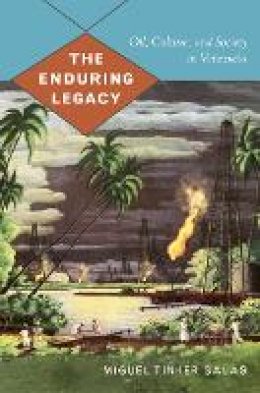Miguel Tinker Salas is Arango Professor in Latin American History and Professor of History and Chicano/a Studies at Pomona College. He is the author of In the Shadow of the Eagles: Sonora and the Transformation of the Border during the Porfiriato and co-editor of Venezuela: Hugo Chávez and the Decline of an “Exceptional Democracy.”
“Tinker Salas has written a monograph that bridges business and social and cultural history, but he has also written a study in class formation, the Venezuelan middle class, to be specific. The result is not only quite successful but also thoroughly enjoyable. . . . Tinker Salas has written a wonderful book that merits a wide audience, not only among students of Venezuela, but anyone who is interested in learning about the legacies of oil worldwide.” - Myrna Santiago, Enterprise and Society “Few other historical books have been published with the perfect timing of Miguel Tinker Salas’s excellent study of the oil multinationals’ cultural and social legacy in Venezuela. . . . Covering a period of around a hundred years, The Enduring Legacy provides a concise, well-supported background to contemporary oil politics and social conflict in Venezuela. . . . The Enduring Legacy will undoubtedly become required reading for students of the Venezuelan oil industry. It will appeal not only to scholars and graduate students but also to undergraduates and general readers.” - Marcelo Bucheli, Business History Review “This book is a good general introduction to some cultural aspects of modern Venezuela, and it shows an important research area in the country’s oil history; Tinker Salas certainly makes a significant contribution to this field.” - Marco Cupolo, Latin American Politics and Society “The Enduring Legacy is a rare exploration of the complex interconnections between the political, economic, social, and cultural aspects of petroleum dependency. . . . Tinker Salas’ unique history is an important addition to the literature on Venezuela and other oil-dependent economies.” - Tom Angotti, Canadian Journal of Latin American & Caribbean Studies “Tinker Salas’s well-researched book helps us understand the role that oil played in shaping class, race, and gender relations in the twentieth century, particularly in the oil industry.” - Harold A. Trinkunas, Latin American Research Review “[A] magnificent survey of the heavy stain of oil that has splashed and seeped across Venezuelan society during the twentieth century. . . . The Enduring Legacy is a sharp piece of writing and research. It complements the existing literature well by providing insight into the human and cultural side of oil operations, and blurring the distinctions between the hegemonic oil companies and exploited Venezuelans.” - Matthew Brown, Bulletin of Latin American Research “The Enduring Legacy illuminates a national landscape deeply shaped by the oil industry, yet often analyzed as if this industry were an economic enclave isolated from Venezuelan society. Miguel Tinker Salas convincingly argues that from the outset, this industry was a crucible of social transformations within and beyond itself. By examining the transmutation of this industry from a foreign enclave to a national industry, this valuable book offers a sweeping view of one hundred years of Venezuelan history.”—Fernando Coronil, author of The Magical State: Nature, Money, and Modernity in Venezuela “Miguel Tinker Salas leaves no stone unturned in his examination of the Venezuelan oil industry and in the process demonstrates its all-encompassing influence on the political, social, economic, and cultural life of the nation throughout most of the twentieth century. One of his most important contributions is to show how the foreign-owned oil companies ingeniously modified policies in order to adapt to the requirements of different regimes, including dictatorships, transitional governments, and democratic ones. At the same time, however, he amply documents how the multinationals generated resentment and resistance as a result of their imposition on Venezuelans of attitudes and patterns from the metropolis and their spurning of local traditions. In short, The Enduring Legacy is a must read for anyone who wants to go beneath the surface to understand the Venezuelan experience in all its dimensions.”—Steve Ellner, author of Rethinking Venezuelan Politics: Class, Conflict, and the Chávez Phenomenon “The Enduring Legacy is a rare exploration of the complex interconnections between the political, economic, social, and cultural aspects of petroleum dependency. . . . Tinker Salas’ unique history is an important addition to the literature on Venezuela and other oil-dependent economies.”
Tom Angotti
Canadian Journal of Latin American and Caribbean Studies
“[A] magnificent survey of the heavy stain of oil that has splashed and seeped across Venezuelan society during the twentieth century. . . . The Enduring Legacy is a sharp piece of writing and research. It complements the existing literature well by providing insight into the human and cultural side of oil operations, and blurring the distinctions between the hegemonic oil companies and exploited Venezuelans.”
Matthew Brown
Bulletin of Latin American Research
“Few other historical books have been published with the perfect timing of Miguel Tinker Salas’s excellent study of the oil multinationals’ cultural and social legacy in Venezuela. . . . Covering a period of around a hundred years, The Enduring Legacy provides a concise, well-supported background to contemporary oil politics and social conflict in Venezuela. . . . The Enduring Legacy will undoubtedly become required reading for students of the Venezuelan oil industry. It will appeal not only to scholars and graduate students but also to undergraduates and general readers.”
Marcelo Bucheli
Business History Review
“This book is a good general introduction to some cultural aspects of modern Venezuela, and it shows an important research area in the country’s oil history; Tinker Salas certainly makes a significant contribution to this field.”
Marco Cupolo
Latin American Politics and Society
“Tinker Salas’s well-researched book helps us understand the role that oil played in shaping class, race, and gender relations in the twentieth century, particularly in the oil industry.”
Harold A. Trinkunas
Latin American Research Review

